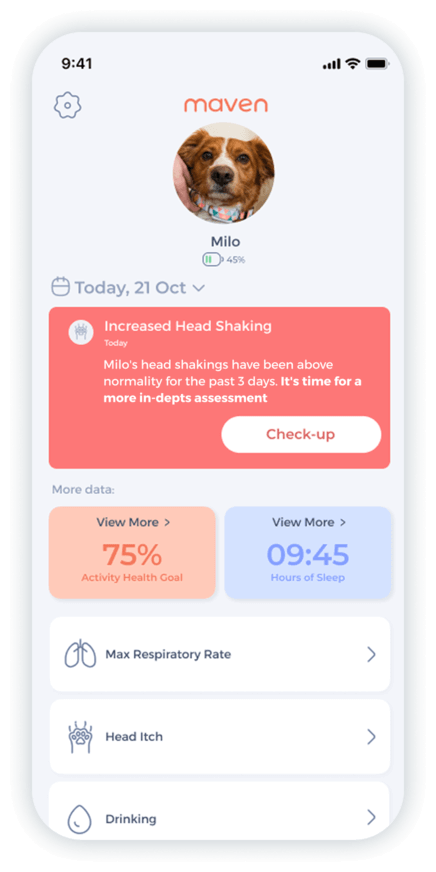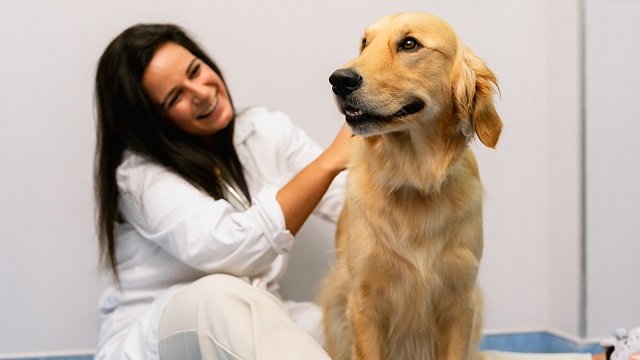How to Recognize, Test, Monitor, and Manage Dog Skin Allergies
Dog skin allergies are a familiar health concern for many pet parents, and rightly so, as skin allergies in dogs are becoming more common. A 2024 study has shown that they affect between 3% and 15% of dogs, while a teaching hospital in Brazil reported in 2021 that as many as 25% of the pups they studied had allergies.
Skin allergies lead to itching and even obsessive scratching, which can be very uncomfortable for your canine friend. It’s essential to understand and manage them as best as possible to ensure pet wellness.
Tools like the Maven Pet Health Monitor can significantly help as they continuously monitor your puppy’s health and detect a potential allergy flare-up early. It’s a 24/7 operating system that alerts you to changes in behavior, restlessness, and scratching, all of which are indicators of skin allergies.
With that in mind, let’s learn more about dog skin allergies and what to do about them.
- Dog skin allergies affect 3% to 25% of canines, leading to discomfort and obsessive scratching.
- Early detection with tools like the Maven Pet Health Monitor helps manage allergy flare-ups effectively.
- Various diets, including limited ingredient and high omega-3 fatty acid foods, can alleviate allergy symptoms.
How to Recognize Dog Skin Allergies
Dog skin allergies, or allergic dermatitis, are among the most common types of dog allergies. Golden Retrievers, Pugs, German Shepherds, French Bulldogs, Terriers, Boxers, and Dalmatians are among the most affected breeds, but they can appear in almost any breed.
Skin allergies are commonly caused by flea bites, food, and environment, and they can be acute and chronic.
You should look for tell-tale signs like:
- Red, inflamed skin patches
- Excessive scratching or skin biting
- Fur loss in specific areas
- Constant licking and paw chewing
- Rubbing against surfaces
- Dry and oily skin
- Watery eyes and swollen face
If you don’t think you can notice all of this or are uncertain if some of these symptoms are common or just a fluke, you can rely on Maven Pet monitors. They detect things like increased scratching, restlessness overnight, and other unusual behaviors and then alert you accordingly.
Seasonal Allergies in Dogs
The most common type of skin allergies in dogs are seasonal, which are often caused by:
- Dust or storage mites
- Mold or yeast
- Grass, tree, and weed pollen
- Fleas
In essence, this form of allergy is like hay fever in humans.
You can notice a seasonal allergy in your pup if they start being itchy in specific areas or all over (but there are other symptoms as well) during a particular time of year. In essence, this happens mainly in the spring or fall.
If your dog has seasonal allergies, here are some tips that will ease their irritation:
- Give your pooch regular baths with hypoallergenic shampoos
- Clean their paws and fur after your walks
- Avoid taking your dog out when the pollen levels are high
- Use creams and anti-itch sprays for temporary relief from scratching
- Consider fatty acid supplements, as they tend to strengthen the coat and relieve itchy skin
“I got the Maven sensor for my 14-year-old Chihuahua mix with heart and trachea issues. It gave me back peace of mind – I can track her RRR, BPM, drinking, and activity anytime and know instantly if something’s wrong. Highly recommend!”

★★★★★
Chiara De Luca
Titti
Dog Allergy Testing
Your vet first needs to examine the puppy to see if there are any external skin parasites and to determine if there’s an infection involved.
If none of these are the culprits, the vet will then try to determine what allergen is affecting the dog.
Various types of tests can be done to discover dog skin allergies. They fall into two main categories:
- Intradermal skin testing — The vet gives a sedative to your canine pal to relax them, shaves a part of the body, and injects several allergens to determine which one causes a reaction.
- Blood or RAST testing — The vet gets a sample of your puppy’s blood to test it for various allergens.
Either way, the testing is painless and effective, similar to what’s done with allergy testing on ourselves. To determine which test you should use on your dog, it’s best to discuss the options with the vet.
Before all of that, it’s always good to use Maven Pet’s continuous monitoring solution to detect early symptoms of allergies and take your dog to the vet before it develops more symptoms or suffers needlessly.
Best Diet for Dogs With Allergies
You can make your pup’s life easier with an ongoing allergy with various diets and foods that are known to be helpful in these cases:
- Limited ingredient diets that avoid common allergens like wheat, beef, lamb, and chicken. Some diets might also avoid nuts, eggs, soy, and corn, which are possible causes of dog allergies but are less common than the previous four.
- Hypoallergenic dog foods are where the proteins are broken down into smaller pieces, which the dog’s body won’t be able to recognize, creating an allergic reaction.
- High omega-3 fatty acid diets that are known to reduce inflammation, promote hair growth, strengthen skin barrier, and more.
Before opting for one type of diet or specific foods, you should consult with your vet. Once you put your dog on a new diet, you can continue using Maven Pet’s tool, as it will track their behavior and might signal reactions to these new foods.
Monitor and Manage Dog Skin Allergies With the Maven Pet Health Monitor
The Maven Pet smart collar monitors can pick up subtle signs when something is off with your pup. This includes things like increased scratching, changes in respiratory rates, unusual activity patterns, differences in water consumption, and other signs that might point toward a skin allergy.


Monitor heart rate, respiratory rate, activity & rest, drinking, itch behavior.
The monitor also uses alerts to inform you about your dog’s health, all in real-time, every minute of every day. This helps you react quickly once something is off.
The tool does much more than that, including early detection of illnesses. Plus, it‘s affordable, priced at only $19.99 a month. To stay as intimate as possible about your pooch’s health, check out the Maven’s Allergy Monitor and learn how it can help you.
Bottom Line
Understanding dog skin allergies is vital in staying proactive with your canine companion’s health and managing the symptoms properly at home.
Besides the advice you’ve learned here, the Maven Pet Health Monitor can be of added service primarily for how good it is at detecting early signs. More than that, as it monitors your dog’s vitals and early signs of allergies 24/7, you get a piece of mind you can hardly find elsewhere.
Read more about our tool and what it can do for you and your dog, and consider subscribing to our service to get easy and stress-free pet care.
Maven Pet focuses on improving the quality of life of our pets with technology, using artificial intelligence (AI) to enable proactive pet care. By accurately collecting and monitoring pet data 24/7 and flagging any irregularities, Maven Pet empowers pet parents and veterinarians to stay ahead of potential health issues, ensuring the well-being and longevity of our beloved companions.




